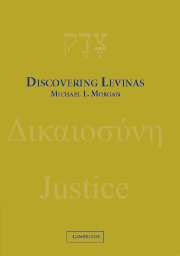Book contents
- Frontmatter
- Contents
- Preface
- Acknowledgments
- 1 Auschwitz, Politics, and the Twentieth Century
- 2 Phenomenology and Transcendental Philosophy
- 3 The Ethical Content of the Face-to-Face
- 4 Philosophy, Totality, and the Everyday
- 5 Meaning, Culture, and Language
- 6 Subjectivity and the Self
- 7 God and Philosophy
- 8 Time, Messianism, and Diachrony
- 9 Ethical Realism and Contemporary Moral Philosophy
- 10 Beyond Language and Expressibility
- 11 Judaism, Ethics, and Religion
- Conclusion: Levinas and the Primacy of the Ethical – Kant, Kierkegaard, and Derrida
- Appendix: Facing Reasons
- Bibliography
- Index
11 - Judaism, Ethics, and Religion
Published online by Cambridge University Press: 05 June 2012
- Frontmatter
- Contents
- Preface
- Acknowledgments
- 1 Auschwitz, Politics, and the Twentieth Century
- 2 Phenomenology and Transcendental Philosophy
- 3 The Ethical Content of the Face-to-Face
- 4 Philosophy, Totality, and the Everyday
- 5 Meaning, Culture, and Language
- 6 Subjectivity and the Self
- 7 God and Philosophy
- 8 Time, Messianism, and Diachrony
- 9 Ethical Realism and Contemporary Moral Philosophy
- 10 Beyond Language and Expressibility
- 11 Judaism, Ethics, and Religion
- Conclusion: Levinas and the Primacy of the Ethical – Kant, Kierkegaard, and Derrida
- Appendix: Facing Reasons
- Bibliography
- Index
Summary
Throughout his career, Levinas understood Western culture and society as a combination of two worlds, the biblical and the Greek – what others have called Hebraism and Hellenism or Athens and Jerusalem. Levinas, of course, has his own special way of interpreting this trope, as we shall see, and his own way of envisioning it in order to estimate the value of Jews and Judaism for Western culture (and world culture). In part, it is a philosopher's perspective on that culture and the themes and tendencies that constitute it. At the same time, it is a Jew's perspective on what Jewish life means, both to Jews and to others. In this chapter, I want to look at this conglomerate of issues. We will cover a number of themes, for Levinas's relationship to Judaism is multifaceted.
One theme is the historical reality of the Jewish people as a persecuted, suffering group, the target of anti-Jewish and anti-semitic attacks. In this regard, the Jews are a kind of historical barometer. The level of suffering they have endured is an indication of the degree to which others have neglected or opposed their responsibility to justice and goodness. Jews and their situation, then, reflect the character of Western culture. This is one of their roles: to demonstrate the ethical character of European and Western society.
- Type
- Chapter
- Information
- Discovering Levinas , pp. 336 - 414Publisher: Cambridge University PressPrint publication year: 2007

